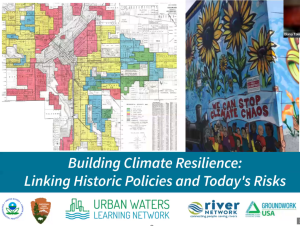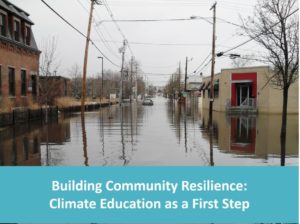Since its inception, members of the Urban Waters Learning Network (UWLN) have advanced stormwater management and other initiatives in their communities that promote climate resilience. We have built on their work and have hosted trainings and compiled resources to help UWLN members and Urban Waters Federal Partnership locations promote equitable climate and community resilience. An overarching goal of this work is to advance approaches that elevate community priorities – in particular those of underserved communities – in all aspects of building resilience. We define climate resilience broadly to include environmental resilience, as well as resilience related to the social and economic impacts of climate change.
If you are working at the intersection of urban waters, water equity and climate resilience and want to share your work with other UWLN members, please email Diana Toledo (dtoledo@rivernetwork.org)
Building Community Resilience 101 – 2019 Webinar Learning Series
Building Community Resilience: Climate Change Education as a First Step
The effects of climate change—like flooding, heat, and drought—are clear to urban waters practitioners around the nation. However, the science of a changing climate can be complex and unclear to communicate. This webinar includes organizations that are using different forms of education to inform their communities about climate change science.
Jennifer Sloan (Groundwork Hudson Valley) shares a primer on relevant climate change topics related to urban waters, followed by examples of climate change curriculum and other online materials. We also hear from two organizations that are incorporating climate change education to drive community action. Juliana Gonzales (The Watershed Project) shared how climate change education ranges from school based programs (like Resilient by Design) to city planning (like regional master planning). Alicia Lehrer (Woonasquatucket River Watershed Association) shares the results of a climate survey that was conducted with residents from an area prone to flooding. Learn about how the survey was constructed and implemented as well as how the survey results help to guide future educational opportunities and advocacy actions for the community.
Centering the Community in Resilience Planning
Community members who are most vulnerable to climate impacts are in the best position to make decisions about how to be better prepared – this webinar provides a framework for raising community voices and provides examples of resiliency plans that benefit the most vulnerable areas in our cities. Corrine Van Hook-Turner (Movement Strategy) discusses the importance of community-based resilience planning and provides some insights on how to do it, drawing on her own experiences as well as highlighting local examples included in the National Association of Climate Resilience Planners guidebook, Community-Based Climate Resilience Planning: A Framework.
Drew Curtis (Ironbound Community Corporation) shares his experience in the South Ironbound community, a neighborhood of Newark, NJ. The South Ironbound community—already heavily impacted by industry, poor air and water quality, and stormwater flooding—was severely affected by Hurricane Sandy. In 2015, the Ironbound Community Corporation, in cooperation with the American Planning Association New Jersey Chapter Community Planning Assistance Program and community members, developed and implemented the South Ironbound Resiliency Action Plan.
After the Storm: Equitable Recovery and Resilient Adaptation
 In the webinar, we hear from Arthur Johnson, Executive Director for the the Lower 9th Ward Center for Sustainable Engagement and Development (CSED) in New Orleans and Yvette Chen, Planning and Policy Analyst from the Fair Share Housing Center (FSHC) in New Jersey. Johnson shares how, fourteen years after Katrina, building resilience looks different today than it did early on. Beyond immediate recovery, CSED works to adapt to the effects of climate change through coastal rehabilitation, greening the built environment, increasing food security, and rebuilding homes to be energy efficient, safe and sustainable. Chen shares housing studies and data that examines post-disaster investments that help FHSC to work on their main goal of ensuring that recovery is both equitable and resilient by prioritizing low-income renters and homeowners.
In the webinar, we hear from Arthur Johnson, Executive Director for the the Lower 9th Ward Center for Sustainable Engagement and Development (CSED) in New Orleans and Yvette Chen, Planning and Policy Analyst from the Fair Share Housing Center (FSHC) in New Jersey. Johnson shares how, fourteen years after Katrina, building resilience looks different today than it did early on. Beyond immediate recovery, CSED works to adapt to the effects of climate change through coastal rehabilitation, greening the built environment, increasing food security, and rebuilding homes to be energy efficient, safe and sustainable. Chen shares housing studies and data that examines post-disaster investments that help FHSC to work on their main goal of ensuring that recovery is both equitable and resilient by prioritizing low-income renters and homeowners.
Building Water Equity and Climate Resilient Communities for ALL – Webinar Learning Series
 In this 6-part series, hosted by the Urban Waters Learning Network, we will highlight a variety of strategies that community-based organizations can use to help their communities anticipate, prepare for and respond to climate risks such as flooding, coastal storms and drought, with a focus on protecting community members who are most vulnerable to climate threats.
In this 6-part series, hosted by the Urban Waters Learning Network, we will highlight a variety of strategies that community-based organizations can use to help their communities anticipate, prepare for and respond to climate risks such as flooding, coastal storms and drought, with a focus on protecting community members who are most vulnerable to climate threats.
The series ran from July 2023 through January 2024. Watch all the recordings below.
Find all of the recorded sessions on our Learning Series Resource Page Here.
Story Map: Community Solutions for Urban Flood Resilience
Building flood resilience—like water—can take many shapes. Members of the Urban Waters Learning Network (UWLN) are working on community solutions for urban flood resilience. Engaging community members, installing green infrastructure, restoring habitats and providing mutual aid to impacted residents are just a few solutions that communities are enacting to adapt to and minimize flooding impacts. In doing so, UWLN members are partnering with local officials, schools, houses of worship and others.
Tools for Equitable Climate Resilience
River Network has developed new Tools for Equitable Climate Resilience with two methods for addressing climate risks: (1) Community Based Participatory Research, and (2) Leadership Development.
The Fostering Community-Led Research and Knowledge toolkit includes three methods for doing this type of research and describes case studies from organizations implementing such programs. The toolkit also includes a Project and Planning Facilitation Guide and a list of additional resources.
The Fostering Community Leadership toolkit includes methods for creating successful leadership programs and describes case studies from organizations implementing these programs.
Informed by “on-the-ground practitioners of leadership development,” the guides highlight that collaborative approaches for equitable resilience are key.
Also see story maps highlighting the toolkits and case studies: Community Leadership for Equitable Climate Resilience and Nothing About Us Without Us.
Additional Resources
Equitable Resilience
- The Benefits of Community-Driven Green Infrastructure – Water Wise Gulf South
- Building Alliances for Equitable Resilience – FEMA
- State of Equity Practice in Public Sector Green Stormwater Infrastructure – GILE
Resilience Planning: Toolkits and Guides
- Building Community Resilience with Nature-Based Solutions: A Guide for Local Communities – FEMA
- Community-Driven Climate Resilience Planning: A Framework
- Guide to Equitable Community-Driven Climate Preparedness Planning
- Marin City People’s People’s Plan
- Our Communities, Our Power: Advancing Resistance and Resilience in Climate Change Adaptation





